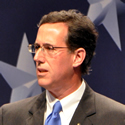National
GOP candidates split wins on Super Tuesday
No clear front-runner after biggest night of primary season

The field of Republican presidential candidates didn’t become any more clear Tuesday night after results were declared for the largest number of contests on a single day during the GOP primary season.
On Super Tuesday, when 10 states held primaries to award a total of 437 delegates, each of the Republican candidates who had previously won states — former Massachusetts Gov. Mitt Romney, former U.S. Sen. Rick Santorum and former U.S. House Speaker Newt Gingrich — took claim to new victories. Libertarian Rep. Ron Paul (R-Texas) didn’t win any states.
Romney won six states: Alaska, Ohio, Massachusetts, Vermont, Idaho and Virginia. Santorum had three in his column: Tennessee, North Dakota and Oklahoma. Gingrich picked up a win in his home state of Georgia.
The contest in Ohio was the most highly contested between Romney and Santorum. A winner in the state, where total of 66 delegates were up for grabs, wasn’t declared until after midnight.
With 99 percent of precincts reporting, Romney won 38 percent of the vote, while Santorum had 37 percent. The win for Romney was narrow even though he reportedly outspent Santorum in Ohio by a 12 to 1 ratio.
Ed Mullen, executive director of Equality Ohio, said a win for Romney was more favorable than a win for the more anti-gay Santorum.
“While Gov. Romney has expressed anti-LGBT positions during the campaign, it is heartening to see that Ohioans rejected the radical anti-LGBT positions of Rick Santorum, who traveled the state with Maggie Gallagher,” Mullen said.
Gallagher, founder of the National Organization for Marriage and one of the most high-profile anti-gay activists, campaigned with Santorum in Ohio and spoke on his behalf at rallies.
But Romney’s other wins aren’t surprising. Massachusetts is the state where Romney has served in his highest capacity as a government official, and Vermont is nearby in geography and Republicans there have a similar temperament. Idaho has a large presence of Mormons, which is Romney’s religion. In Virginia, Romney was one of two candidates on the ballot along with Paul.
Kara Suffredini, executive director of MassEquality, said Romney’s win in Massachusetts “was not unexpected” as she cautioned a Romney presidency would “be very bad news for LGBT people across America.”
“To go from President Barack Obama, who has accomplished more than any president in U.S. history to embrace the full dignity of LGBT people across the United States and around the globe, to former Massachusetts Gov. Mitt Romney, who has actively opposed justice for LGBT youth and families at every turn, would be a tremendous setback for LGBT Americans,” Suffredini said.
As governor, Romney opposed a Massachusetts Supreme Court granting same-sex couples the right to marry and renewed enforcement of a 1913 anti-miscegenation law to block gay couples from other states from coming to the state to marry. According to MassEquality, Romney abolished the Governor’s Commission on GLBT Youth and rescinded an executive order prohibiting sexual orientation discrimination in the state workforce. Another Republican, former Gov. William Weld, had put those measures in place.
Despite the split wins among the candidates, Romney still has the lead in terms of total delegates won in the Republican primary. According to the Associated Press, Romney has 212 while Santorum has 84, Gingrich has 72 and Paul has 22.
Jimmy LaSalvia, executive director of GOProud, said Romney has won “the lion’s share of delegates at stake” and Super Tuesday “all but guarantees that Romney will be the eventual nominee of the Republican Party.” LaSalvia has personally endorsed the candidate in the Republican primary.
“Obviously this process is technically not over,” LaSalvia said. “Despite the large delegate lead enjoyed by Gov. Romney, other candidates in the field have made it clear that they intend to continue on. The question that Republicans, and conservatives in particular, must begin to ask themselves is whether continuing this process is in the best interest of our movement, the party and – most importantly – our country.”
LaSalvia also took a dig at President Obama, saying he and “the left” are “fanning the flames of the culture wars” to distract Americans from economic issues facing the country.
Heads of LGBT groups in Tennessee and Oklahoma said they weren’t surprised Santorum won in their states because they said his anti-gay message resonate with voters there.
Chris Sanders, chair of Tennessee Equality Project’s Nashville Committee, said Tennessee’s LGBT community “is disgusted but not surprised” with Santorum’s win.
“Santorum’s comments about our community track closely with the kind of anti-equality legislation we’re fighting in this state,” Sanders said. “The results show that we have significant work to do in Tennessee if we are going to move the culture in favor of equality and away from the worst discriminatory policies and rhetoric.”
Tennessee State Sen. Stacey Campfield was among those who came to support Santorum even though the lawmaker was initially Gingrich’s co-chair of his Tennessee. He’s sponsor of the legislation commonly known as the “Don’t Say Gay” bill, which would prohibit discussion about homosexuality in schools from kindergarten through eighth grade.
Toby Jenkins, executive director of Oklahomans for Equality, also he’s “not surprised” with Santorum’s win in his state.
“He used a lot of buzzwords and fear statements that are people out here in this part of the country identify with because he panders to their worst fears and makes all sorts of outrageous suggestions about the LGBT community,” Jenkins said. “The reality is we’re not some outside force. Most of us out here are products of Oklahoma.”
Santorum has made his opposition to LGBT rights — in particular his opposition to same-sex marriage — well-known throughout his campaign across the country.
Jenkins said he isn’t aware of any anti-gay rhetoric from Santorum while he was in the state, but heard reports of people who were escorted out of his events because they pressed him on social issues.
Each of the Republican candidates who’ve won states have staked out anti-gay positions. Romney, Santorum and Gingrich have a signed a pledge from the National Organization for Marriage committed themselves upon election to the White House to backing a Federal Marriage Amendment, defending the Defense of Marriage Act and setting up a commission on religious freedom to investigate alleged harassment of opponents of same-sex marriage.
Santorum has said he’d reinstate “Don’t Ask, Don’t Tell,” while Gingrich has said he’d order an “extensive review” of going back to the policy. Romney said he has no plans to return to “Don’t Ask, Don’t Tell.”
The next major contest will take place on Saturday in Kansas, where 40 delegates are in play. The U.S. protectorates, Guam, Northern Mariana Islands and the U.S. Virgin Islands, are also set to hold conventions.
NOTE: This post has been updated.
U.S. Supreme Court
Supreme Court to consider bans on trans athletes in school sports
27 states have passed laws limiting participation in athletics programs

The U.S. Supreme Court on Thursday agreed to hear two cases involving transgender youth challenging bans prohibiting them from participating in school sports.
In Little v. Hecox, plaintiffs represented by the ACLU, Legal Voice, and the law firm Cooley are challenging Idaho’s 2020 ban, which requires sex testing to adjudicate questions of an athlete’s eligibility.
The 9th U.S. Circuit Court of Appeals described the process in a 2023 decision halting the policy’s enforcement pending an outcome in the litigation. The “sex dispute verification process, whereby any individual can ‘dispute’ the sex of any female student athlete in the state of Idaho,” the court wrote, would “require her to undergo intrusive medical procedures to verify her sex, including gynecological exams.”
In West Virginia v. B.P.J., Lambda Legal, the ACLU, the ACLU of West Virginia, and Cooley are representing a trans middle school student challenging the Mountain State’s 2021 ban on trans athletes.
The plaintiff was participating in cross country when the law was passed, taking puberty blockers that would have significantly reduced the chances that she could have a physiological advantage over cisgender peers.
“Like any other educational program, school athletic programs should be accessible for everyone regardless of their sex or transgender status,” said Joshua Block, senior counsel for the ACLU’s LGBTQ and HIV Project. “Trans kids play sports for the same reasons their peers do — to learn perseverance, dedication, teamwork, and to simply have fun with their friends,” Block said.
He added, “Categorically excluding kids from school sports just because they are transgender will only make our schools less safe and more hurtful places for all youth. We believe the lower courts were right to block these discriminatory laws, and we will continue to defend the freedom of all kids to play.”
“Our client just wants to play sports with her friends and peers,” said Lambda Legal Senior Counsel Tara Borelli. “Everyone understands the value of participating in team athletics, for fitness, leadership, socialization, and myriad other benefits.”
Borelli continued, “The U.S. Court of Appeals for the Fourth Circuit last April issued a thoughtful and thorough ruling allowing B.P.J. to continue participating in track events. That well-reasoned decision should stand the test of time, and we stand ready to defend it.”
Shortly after taking control of both legislative chambers, Republican members of Congress tried — unsuccessfully — to pass a national ban like those now enforced in 27 states since 2020.
Federal Government
UPenn erases Lia Thomas’s records as part of settlement with White House
University agreed to ban trans women from women’s sports teams

In a settlement with the Trump-Vance administration announced on Tuesday, the University of Pennsylvania will ban transgender athletes from competing and erase swimming records set by transgender former student Lia Thomas.
The U.S. Department of Education’s Office for Civil Rights found the university in violation of Title IX, the federal rights law barring sex based discrimination in educational institutions, by “permitting males to compete in women’s intercollegiate athletics and to occupy women-only intimate facilities.”
The statement issued by University of Pennsylvania President J. Larry Jameson highlighted how the law’s interpretation was changed substantially under President Donald Trump’s second term.
“The Department of Education OCR investigated the participation of one transgender athlete on the women’s swimming team three years ago, during the 2021-2022 swim season,” he wrote. “At that time, Penn was in compliance with NCAA eligibility rules and Title IX as then interpreted.”
Jameson continued, “Penn has always followed — and continues to follow — Title IX and the applicable policy of the NCAA regarding transgender athletes. NCAA eligibility rules changed in February 2025 with Executive Orders 14168 and 14201 and Penn will continue to adhere to these new rules.”
Writing that “we acknowledge that some student-athletes were disadvantaged by these rules” in place while Thomas was allowed to compete, the university president added, “We recognize this and will apologize to those who experienced a competitive disadvantage or experienced anxiety because of the policies in effect at the time.”
“Today’s resolution agreement with UPenn is yet another example of the Trump effect in action,” Education Secretary Linda McMahon said in a statement. “Thanks to the leadership of President Trump, UPenn has agreed both to apologize for its past Title IX violations and to ensure that women’s sports are protected at the university for future generations of female athletes.”
Under former President Joe Biden, the department’s Office of Civil Rights sought to protect against anti-LGBTQ discrimination in education, bringing investigations and enforcement actions in cases where school officials might, for example, require trans students to use restrooms and facilities consistent with their birth sex or fail to respond to peer harassment over their gender identity.
Much of the legal reasoning behind the Biden-Harris administration’s positions extended from the 2020 U.S. Supreme Court case Bostock v. Clayton County, which found that sex-based discrimination includes that which is based on sexual orientation or gender identity under Title VII rules covering employment practices.
The Trump-Vance administration last week put the state of California on notice that its trans athlete policies were, or once were, in violation of Title IX, which comes amid the ongoing battle with Maine over the same issue.
New York
Two teens shot steps from Stonewall Inn after NYC Pride parade
One of the victims remains in critical condition

On Sunday night, following the annual NYC Pride March, two girls were shot in Sheridan Square, feet away from the historic Stonewall Inn.
According to an NYPD report, the two girls, aged 16 and 17, were shot around 10:15 p.m. as Pride festivities began to wind down. The 16-year-old was struck in the head and, according to police sources, is said to be in critical condition, while the 17-year-old was said to be in stable condition.
The Washington Blade confirmed with the NYPD the details from the police reports and learned no arrests had been made as of noon Monday.
The shooting took place in the Greenwich Village neighborhood of Manhattan, mere feet away from the most famous gay bar in the city — if not the world — the Stonewall Inn. Earlier that day, hundreds of thousands of people marched down Christopher Street to celebrate 55 years of LGBTQ people standing up for their rights.
In June 1969, after police raided the Stonewall Inn, members of the LGBTQ community pushed back, sparking what became known as the Stonewall riots. Over the course of two days, LGBTQ New Yorkers protested the discriminatory policing of queer spaces across the city and mobilized to speak out — and throw bottles if need be — at officers attempting to suppress their existence.
The following year, LGBTQ people returned to the Stonewall Inn and marched through the same streets where queer New Yorkers had been arrested, marking the first “Gay Pride March” in history and declaring that LGBTQ people were not going anywhere.
New York State Assemblywoman Deborah Glick, whose district includes Greenwich Village, took to social media to comment on the shooting.
“After decades of peaceful Pride celebrations — this year gun fire and two people shot near the Stonewall Inn is a reminder that gun violence is everywhere,” the lesbian lawmaker said on X. “Guns are a problem despite the NRA BS.”
-

 Sports5 days ago
Sports5 days agoTrans cyclist’s victory sparks outrage in conservative media
-

 Congress5 days ago
Congress5 days agoCongress passes ‘Big, Beautiful Bill’ with massive cuts to health insurance coverage
-

 Israel5 days ago
Israel5 days agoActivist recalls experience in Tel Aviv after Israel-Iran war began
-

 Celebrity News5 days ago
Celebrity News5 days agoNina West’s ‘Sugar in the Tank’ tour comes to Rehoboth Beach













